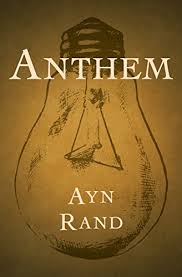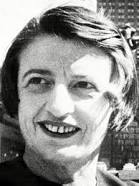Anthem
Anthem is a dystopian fiction novella by Russian-American writer Ayn Rand, written in 1937 and first published in 1938 in the United Kingdom. The story takes place at an unspecified future date when mankind has entered another Dark Age.
Ayn Rand was a Russian-American writer and philosopher. She is known for her two best-selling novels, The Fountainhead and Atlas Shrugged, and for developing a philosophical system she named Objectivism. Educated in Russia, she moved to the United States in 1926. She had a play produced on Broadway in 1935 and 1936.PART ONE It is a sin to write this. It is a sin to think words no others think and to put them down upon a paper no others are to see. It is base and evil. It is as if we were speaking alone to no ears but our own. And we know well that there is no transgression blacker than to do or think alone. We have broken the laws. The laws say that men may not write unless the Council of Vocations bid them so. May we be forgiven! But this is not the only sin upon us. We have committed a greater crime, and for this crime there is no name. What punishment awaits us if it be discovered we know not, for no such crime has come in the memory of men and there are no laws to provide for it. It is dark here. The flame of the candle stands still in the air. Nothing moves in this tunnel save our hand on the paper. We are alone here under the earth. It is a fearful word, alone. The laws say that none among men may be alone, ever and at any time, for this is the great transgression and the root of all evil. But we have broken many laws. And now there is nothing here save our one body, and it is strange to see only two legs stretched on the ground, and on the wall before us the shadow of our one head. The walls are cracked and water runs upon them in thin threads without sound, black and glistening as blood. We stole the candle from the larder of the Home of the Street Sweepers. We shall be sentenced to ten years in the Palace of Corrective Detention if it be discovered. But this matters not. It matters only that the light is precious and we should not waste it to write when we need it for that work which is our crime. Nothing matters save the work, our secret, our evil, our precious work. Still, we must also write, for—may the Council have mercy upon us!—we wish to speak for once to no ears but our own. Our name is Equality 7-2521, as it is written on the iron bracelet which all men wear on their left wrists with their names upon it. We are twenty-one years old. We are six feet tall, and this is a burden, for there are not many men who are six feet tall. Ever have the Teachers and the Leaders pointed to us and frowned and said: “There is evil in your bones, Equality 7-2521, for your body has grown beyond the bodies of your brothers.” But we cannot change our bones nor our body. We were born with a curse. It has always driven us to thoughts which are forbidden. It has always given us wishes which men may not wish. We know that we are evil, but there is no will in us and no power to resist it. This is our wonder and our secret fear, that we know and do not resist. We strive to be like all our brother men, for all men must be alike. Over the portals of the Palace of the World Council, there are words cut in the marble, which we repeat to ourselves whenever we are tempted: “WE ARE ONE IN ALL AND ALL IN ONE. THERE ARE NO MEN BUT ONLY THE GREAT WE, ONE, INDIVISIBLE AND FOREVER.” We repeat this to ourselves, but it helps us not. These words were cut long ago. There is green mould in the grooves of the letters and yellow streaks on the marble, which come from more years than men could count. And these words are the truth, for they are written on the Palace of the World Council, and the World Council is the body of all truth. Thus has it been ever since the Great Rebirth, and farther back than that no memory can reach. But we must never speak of the times before the Great Rebirth, else we are sentenced to three years in the Palace of Corrective Detention. It is only the Old Ones who whisper about it in the evenings, in the Home of the Useless. They whisper many strange things, of the towers which rose to the sky, in those Unmentionable Times, and of the wagons which moved without horses, and of the lights which burned without flame. But those times were evil. And those times passed away, when men saw the Great Truth which is this: that all men are one and that there is no will save the will of all men together. All men are good and wise. It is only we, Equality 7-2521, we alone who were born with a curse. For we are not like our brothers. And as we look back upon our life, we see that it has ever been thus and that it has brought us step by step to our last, supreme transgression, our crime of crimes hidden here under the ground. We remember the Home of the Infants where we lived till we were five years old, together with all the children of the City who had been born in the same year. The sleeping halls there were white and clean and bare of all things save one hundred beds. We were just like all our brothers then, save for the one transgression: we fought with our brothers. There are few offenses blacker than to fight with our brothers, at any age and for any cause whatsoever. The Council of the Home told us so, and of all the children of that year, we were locked in the cellar most often. When we were five years old, we were sent to the Home of the Students, where there are ten wards, for our ten years of learning. Men must learn till they reach their fifteenth year. Then they go to work. In the Home of the Students we arose when the big bell rang in the tower and we went to our beds when it rang again. Before we removed our garments, we stood in the great sleeping hall, and we raised our right arms, and we said all together with the three Teachers at the head: “We are nothing. Mankind is all. By the grace of our brothers are we allowed our lives. We exist through, by and for our brothers who are the State. Amen.” Then we slept. The sleeping halls were white and clean and bare of all things save one hundred beds. We, Equality 7-2521, were not happy in those years in the Home of the Students. It was not that the learning was too hard for us. It was that the learning was too easy. This is a great sin, to be born with a head which is too quick. It is not good to be different from our brothers, but it is evil to be superior to them. The Teachers told us so, and they frowned when they looked upon us. So we fought against this curse. We tried to forget our lessons,
Translation
Translate and read this book in other languages:
Select another language:
- - Select -
- 简体中文 (Chinese - Simplified)
- 繁體中文 (Chinese - Traditional)
- Español (Spanish)
- Esperanto (Esperanto)
- 日本語 (Japanese)
- Português (Portuguese)
- Deutsch (German)
- العربية (Arabic)
- Français (French)
- Русский (Russian)
- ಕನ್ನಡ (Kannada)
- 한국어 (Korean)
- עברית (Hebrew)
- Gaeilge (Irish)
- Українська (Ukrainian)
- اردو (Urdu)
- Magyar (Hungarian)
- मानक हिन्दी (Hindi)
- Indonesia (Indonesian)
- Italiano (Italian)
- தமிழ் (Tamil)
- Türkçe (Turkish)
- తెలుగు (Telugu)
- ภาษาไทย (Thai)
- Tiếng Việt (Vietnamese)
- Čeština (Czech)
- Polski (Polish)
- Bahasa Indonesia (Indonesian)
- Românește (Romanian)
- Nederlands (Dutch)
- Ελληνικά (Greek)
- Latinum (Latin)
- Svenska (Swedish)
- Dansk (Danish)
- Suomi (Finnish)
- فارسی (Persian)
- ייִדיש (Yiddish)
- հայերեն (Armenian)
- Norsk (Norwegian)
- English (English)
Citation
Use the citation below to add this book to your bibliography:
Style:MLAChicagoAPA
"Anthem Books." Literature.com. STANDS4 LLC, 2025. Web. 22 Feb. 2025. <https://www.literature.com/book/anthem_329>.








Discuss this Anthem book with the community:
Report Comment
We're doing our best to make sure our content is useful, accurate and safe.
If by any chance you spot an inappropriate comment while navigating through our website please use this form to let us know, and we'll take care of it shortly.
Attachment
You need to be logged in to favorite.
Log In